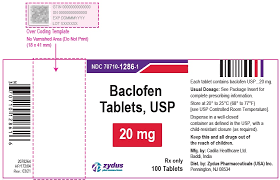What to Avoid While Taking Baclofen
Baclofen is a medication that is commonly prescribed to treat muscle spasms and spasticity caused by conditions such as multiple sclerosis and spinal cord injuries. While it can be an effective medication for many patients, it is important to be aware of the potential risks associated with taking baclofen.
In this article, we will discuss what to avoid while taking baclofen, including drug interactions, alcohol consumption, and the risks of overdose or withdrawal. It is important to take these precautions seriously in order to ensure that you are taking baclofen safely and effectively.
1. Introduction: What is Baclofen and Why is it Prescribed?
The Basics of Baclofen
Baclofen is a medication that is typically prescribed as a muscle relaxant. It works by acting on the central nervous system, reducing the activity of certain neurons and thus relaxing muscles. Baclofen is available in the form of tablets, capsules, and intrathecal injections.
What is Baclofen Used For?
Baclofen is prescribed to treat conditions such as spasticity, multiple sclerosis, spinal cord injuries, cerebral palsy, and other neurological disorders. It is also sometimes used to treat alcohol withdrawal symptoms.

2. Baclofen Interactions: What to Avoid
a. Drugs that Interact with Baclofen
Baclofen can interact with certain medications, including antidepressants, opioids, and antihistamines. It is important to inform your doctor about all the medications you are taking to avoid any harmful interactions.
b. Herbs and Supplements that Interact with Baclofen
Some herbs and supplements can also interact with baclofen, including kava, valerian, and St. John’s wort. It is important to consult with your doctor before taking any herbal or dietary supplements while on baclofen.
c. Food Interactions with Baclofen
There are no significant food interactions associated with baclofen. However, taking the medication with food may help reduce stomach upset.
3. Alcohol and Baclofen: Why It’s Important to Be Careful
The Risks of Combining Baclofen and Alcohol
Combining baclofen with alcohol can intensify the sedative effects of both substances, leading to dizziness, sluggishness, and respiratory depression. This combination can also increase the risk of overdose and cause serious harm.
How to Safely Drink Alcohol While Taking Baclofen
It is important to avoid drinking alcohol while taking baclofen. However, if you must drink, it is recommended to do so in moderation and only after consulting with your doctor.
4. Baclofen Overdose: What to Watch For
The Symptoms of a Baclofen Overdose
Symptoms of a baclofen overdose may include confusion, drowsiness, respiratory depression, seizures, and coma. It is important to seek immediate medical attention if you experience any of these symptoms.
What to Do in Case of Overdose
If you suspect an overdose of baclofen, call emergency services immediately. Treatment options may include gastric lavage, activated charcoal, and symptomatic treatment based on the severity of symptoms. It is important to seek medical attention as soon as possible to avoid long-lasting complications.
5. Side Effects of Baclofen: How to Manage Them
If you’re taking baclofen for muscle spasms, you may experience some potential side effects. These side effects can range from mild to severe and may include drowsiness, dizziness, headache, nausea, muscle weakness, and even seizures.
Possible Side Effects of Baclofen
Common side effects of baclofen can include drowsiness, fatigue, dizziness, headache, nausea, constipation, and dry mouth. Less common but more serious side effects may include seizures, hallucinations, confusion, and difficulty breathing.
How to Minimize or Manage Side Effects
To minimize or manage the side effects of baclofen, speak to your doctor or pharmacist about recommended dosages and the frequency of medication intake. Additionally, you can also try taking the medication with food to reduce stomach upset and avoid alcohol and other medications that may interact with baclofen. If you experience severe side effects, such as seizures or difficulty breathing, seek medical attention immediately.
6. Baclofen Withdrawal: Symptoms and How to Avoid Them
Baclofen should not be discontinued abruptly, as it may result in withdrawal symptoms. Withdrawal symptoms can be severe and include seizures, hallucinations, confusion, and even death in rare cases.
Withdrawal Symptoms Associated with Baclofen
Withdrawal symptoms associated with baclofen include seizures, hallucinations, confusion, anxiety, tremors, and increased heart rate.
How to Gradually Stop Taking Baclofen
To avoid withdrawal symptoms, it’s essential to gradually reduce the dosage of baclofen under the guidance of your doctor. Abrupt discontinuation of the medication should be avoided. It may take several weeks or months to taper off the medication completely, depending on the dosage.
7. Precautions While Taking Baclofen: What Your Doctor Probably Told You
Baclofen should not be taken without medical supervision. Your doctor will advise you on potential risks and precautions associated with taking baclofen, including contraindications and potential drug interactions.
What to Tell Your Doctor Before Taking Baclofen
Before taking baclofen, inform your doctor about any medical conditions you may have, including allergies, kidney or liver problems, seizures, and mental health issues. Additionally, disclose all medications, supplements, and herbal remedies you’re taking.
Precautions to Take While Taking Baclofen
While taking baclofen, avoid driving, operating heavy machinery, or performing any activities that require alertness until you know how your body responds to the medication. Also, avoid alcohol and other central nervous system depressants as they may increase the risk of drowsiness and dizziness.
8. Conclusion: Staying Safe While Taking Baclofen
While baclofen is a useful medication for managing muscle spasticity, it is essential to take necessary precautions and be aware of the potential side effects, withdrawal symptoms, and drug interactions. Always follow your doctor’s instructions and report any adverse reactions to the medication.
Taking Baclofen Safely- Recap of Key Points
To take baclofen safely, it’s essential to: – Follow your doctor’s instructions and recommended dosages – Gradually taper off the medication to avoid withdrawal symptoms – Inform your doctor of all medical conditions, medications, supplements, and herbal remedies you’re taking – Be aware of potential side effects and drug interactions – Avoid alcohol and other central nervous system depressants – Seek medical attention immediately if you experience any severe symptoms or adverse reactions.
In conclusion, baclofen can be a helpful medication for managing muscle spasms and spasticity, but it is important to be aware of the potential risks associated with its use. By avoiding certain medications and substances, managing side effects, and taking precautions, you can safely and effectively use baclofen as part of your treatment plan. Always consult with your healthcare provider about any concerns you may have and follow their instructions for taking this medication.
FAQ:
What should I do if I miss a dose of baclofen?
If you miss a dose of baclofen, take it as soon as you remember. However, if it is close to the time for your next dose, skip the missed dose and resume your usual dosing schedule. Do not double the dose to catch up.
Can I drink alcohol while taking Baclofen?
It is not recommended to drink alcohol while taking baclofen, as it can increase the risk of side effects and have dangerous interactions. If you choose to drink alcohol, talk to your doctor first and make sure to do so in moderation.
What are some common side effects of baclofen?
Common side effects of baclofen include drowsiness, dizziness, weakness, nausea, and headache. These side effects usually go away as your body adjusts to the medication. However, if they persist or become severe, talk to your doctor.
How long does it take for Baclofen to start working?
The time it takes for baclofen to start working can vary depending on the individual and the condition being treated. Some people may start to feel relief within a few hours, while others may take several days or weeks to notice a difference. It is important to be patient and continue taking the medication as directed by your doctor.
You May Also Like
- Tips for Getting Better Sleep with Anxiety in 2024
- Split Renal Test: The Best Way to Diagnose Dangerous Kidney Problems in 2024
- Revolutionizing Treatment-Resistant Schizophrenia Solutions: Unleashing Hope in 2024
- Demystifying Obsessive-Compulsive Disorder in 2024: Understanding OCD from the Inside Out
- Unmasking the Mind: Can the DAP Test Truly Decode Your Mind in 2023?
